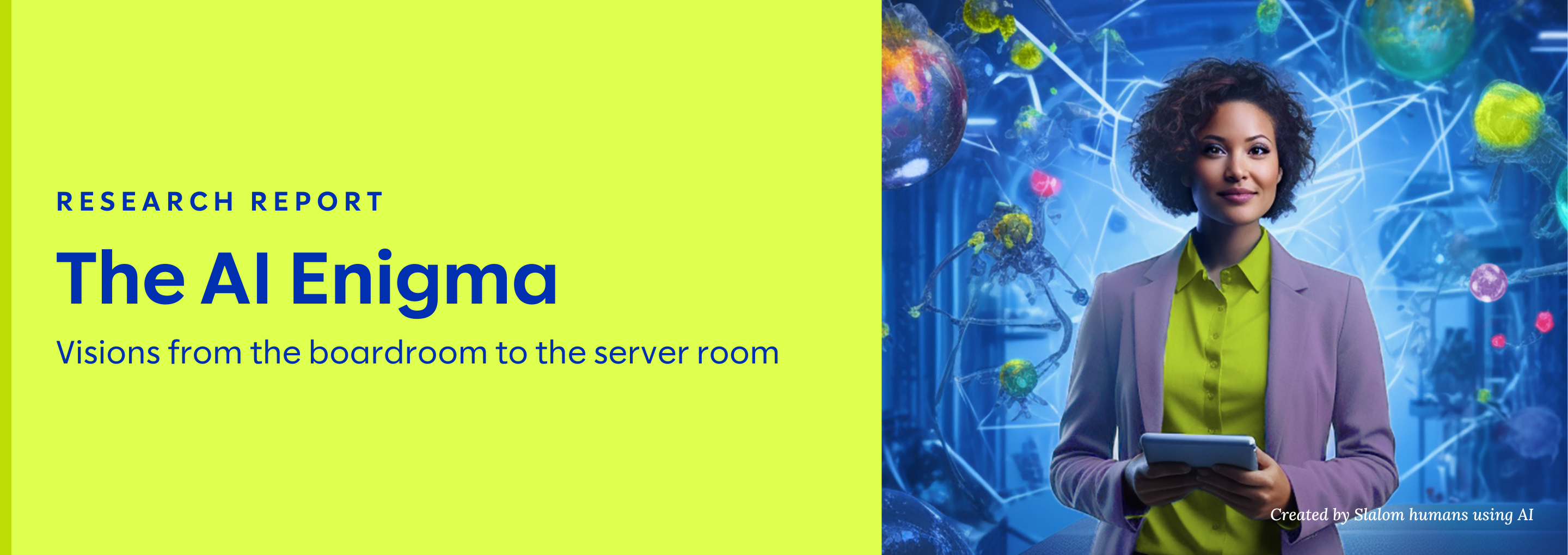
Steering your organization through the AI revolution
5-Minute Read | October 2023 | Get the full report ⇓
In brief
The artificial intelligence landscape is both promising and complex, a duality that can challenge even the most established organizations. Slalom’s recent study amongst C-suite executives reveals the differences and similarities in leadership perspectives within executive teams. The report shows where to focus moving forward for successfully enabling AI within your organization.
While historically, the strategic direction was owned by the CEO and technology by the CIO, we’re at a pivotal moment where technology and business have moved beyond mere intersection and have merged. Every business discussion today is infused with technology, and every technological advancement is deeply rooted in business outcomes. When it comes to enabling AI within an organization, every executive has a role to play, and collaboration and healthy dissent are critical to success.
Among the research findings is the strong acknowledgment for needing distinctly human skillsets in the AI-driven workplace - a fiercely human approach. The rapid evolution of AI demands a workforce well-versed in current technologies and agile enough to adapt and work in new human-machine combinations.
With nearly 61% of organizations surveyed sharing that they are full steam ahead regarding AI transformation initiatives and 26% making incremental steps ahead, AI will continue to be a strategic priority for organizations in 2024 – and beyond.
This report includes a distillation of insights from 200+ US C-suite executives surveyed in Q3 2023, coupled with decades of the authors’ experience in business strategy and technology, to break down current perceptions and ways to move ahead. Whether you’re just starting or are in the midst of your AI journey, this research – and the recommendations it includes – will help you align, implement, and, most importantly, transform.
Key themes
- The new measure for AI readiness is adaptability - and most organizations don’t have confidence in their own
- Creativity ranked as the top skill needed for the AI-driven workplace
- Majority of organizations are preparing to increase resources towards AI investments in 2024
Adaptability allows an organization to respond quickly to changes, particularly in technology. In the context of AI, this translates to swiftly integrating new algorithms, adjusting business processes to fit AI outputs, and continually upskilling employees to harness AI’s potential.
However, when asked to evaluate their organization’s ability to demonstrate these qualities, most organizations expressed room for improvement or significant challenges.
Unpacking the confidence spectrum in AI adaptability

Without adaptability, even the most advanced AI can quickly become obsolete or even a hindrance. This range of confidence levels from survey respondents reflects the broader discourse on AI adoption, illustrating that most organizations are navigating the complexities of change with varying degrees of success.
2. Creativity ranked as the top skill needed for the AI-driven workplace
Many organizations need help finding talent with the adaptability and flexibility required to thrive in a constantly evolving AI-driven landscape, a challenge that can inhibit even the most ambitious AI initiatives.
When asked to identify the most critical skills needed as AI continues to evolve the workplace, technological competencies were not the top identified by surveyed executives.
“Creativity, innovation, and futures thinking” was the most selected choice, followed closely by “critical thinking and problem-solving,” indicating strong support for what may have been traditionally considered softer skills.
Top-ranked skills for the AI-driven workplace

Digital- and technology-focused skills were identified as the third and fourth most important competencies. “Cognitive flexibility and learning agility,” or the ability to learn new concepts and tools, rounds out the top five.
These insights emphasize the necessity for a well-rounded approach to adaptability and problem-solving as we move into the future.
3. The majority of organizations are preparing to increase resources toward AI investments in 2024
AI is no longer a “nice to have” or a luxury solely for innovative companies – it’s imperative to remain competitive. Approximately 70% of companies surveyed plan to increase resources such as budget, employee time, training, and technological infrastructure towards AI investments in 2024.
Plans for 2024 investments towards AI

This prioritization of investment is significant, with AI becoming the eminent topic and focus of organizations across industries.
Closing
Discussions around AI transformations will be pervasive for years to come – an organization enabled by AI is our new normal and something many companies will continue striving for in the near term.
It’s pivotal that leaders recognize differences in opinions and seek alignment and deeper collaboration to succeed together. We stand at an exciting juncture where the future of AI is yet to be defined, but the possibilities are limitless. It’s an inflection point, and our decisions today will shape the technology landscape and success of organizations for years.
Download the full report
About the study
This survey was conducted in Q3 2023 with 200 C-suite executives across the US, spanning industries and functional areas. Slalom’s AI leadership team then analyzed the results.